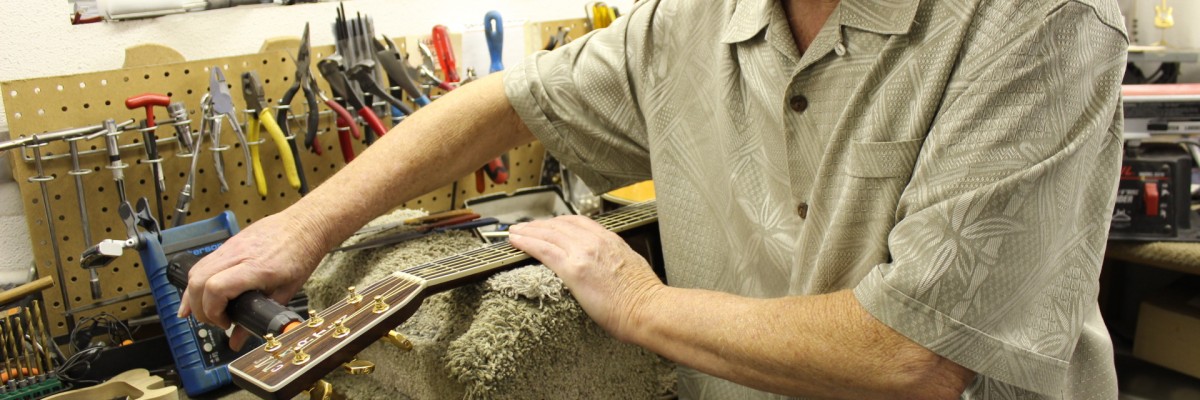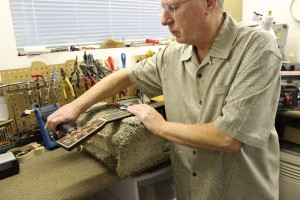Q. How do you describe your profession?
A. I am a Luthier. A Luthier is someone who builds and repairs string instruments. I have been a guitar builder, but the last 20 years I have had a focus on string instrument set up and repair. The instruments that I service include acoustic guitar, electric guitar, electric bass, mandolin, dobro, banjo and other folk and bluegrass instruments. The majority of my work is on guitars because the guitar is such a popular instrument, but I love working on mandolins and banjos as well. In addition to the guitar, I play both of those instruments and I have gotten very good at working on them.
Q. What is an instrument set up?
A. Guitar set ups are a mainstay of my customer work. Guitars need to be set up to play properly and easily. A set up can include adjustments to the saddle, nut, truss rod, and may include leveling and polishing the frets. There is quite a bit of expertise required to set up an instrument for optimum performance.
Guitars coming out of a factory are not generally properly set up. Even very expensive guitars can benefit from a set up from an experienced Luthier. I have many customers who purchase a new guitar and come to my shop directly from the music store for a set up before taking it home to play. The benefit to the player is a guitar that plays perfectly for their particular style and technique. A guitar that is properly set up is really a joy to play.
I really enjoy the personal connection to my customers. I take the time to get to know the playing style of my customers and I like to understand the sound that they are looking for. This really shapes how I set up their instrument. For example a player with a light finger style technique will require a much different set up than a bluegrass player that brings a very heavy attack and demands a lot of volume from his acoustic guitar. The personal dialogue with the player allows me to fine tune their instrument and deliver a superior result for the musicians that I work with.
Q. What other services do you provide
A. I do a lot of repairs and modifications. I can usually take a badly damaged instrument and bring it back to playing condition with the most cost effective method. I also do instrument modifications, like upgrading pickups, and tuning machines, etc. Sometimes a moderately priced instrument can really benefit from some upgraded components.
Q. Who are your customers?
A. My customers run the whole gamut from beginners to advanced players and they tend to bring in instruments in all price ranges. Also, over the years I have developed quite a following of more mature players who have come to understand the value of an expert set up or specialized repair.
Q. What is your background?
A. I grew up in Corvallis Oregon and started playing the guitar when I was 16 year old. I attended Oregon State University as a Psychology major. In my last year of college I was enrolled in a projects course, where a student could build anything that they proposed. I decided that I would build an acoustic guitar for the class project. The course was for the entire school year so I had to learn to build a guitar and complete it in that time frame. I did not have a woodworking background, so I turned to one of the few guitar-building books that were available at the time, a classical guitar-building manual by Irving Sloane, even though I planned to build a steel string guitar. I had to build my own forms, mill the woods, and assemble all of the tools and supplies. This was 1972, there was not much in the way of Luthier resources. The guitar turned out great; I found that I had a natural knack for building guitars. The project launched my life long career as a Luthier.
After college I began working as a guitar repairmen in music stores to gain experience. In time I developed the idea of running an independent shop from my home. I realized that working from a home based shop would allow me to keep my overhead low, keep prices fair, and stay focused on my customers, without the distraction of operating a retail location.
I never felt the need get formal training; I seem to have a gift for working independently and simply figuring things out. In the 1980’s a Luthier supply company Stewart MacDonald emerged. They provided books and instructional material, woods, and specialized tools, and became a valuable resource to the growing Luthier community. I am largely self-taught. Today, my expertise is the result of over 40 years of working on thousands of guitars.
Q. What advice do you have for guitar players who are purchasing an instrument?
A. I ask about their budget and price range to provide specific guidance. In an acoustic guitar you want to look for a solid wood top, you can settle for laminated wood sides and back if you do not have the budget for an all solid wood guitar. There are some good local music stores that I will refer customers to.
Q. What about purchasing a guitar online?
A. It’s risky. Customers need to make sure that they have an opportunity to accept the guitar on trial with a return privilege. Many of my customers will ask me to inspect and approve the guitar before finalizing the purchase. I have seen many customers who have brought me guitars purchased online without return privileges leave my shop very unhappy after I have delivered a bad report on the instrument that they have purchased. There are so many things that can go wrong with a new or used instrument that you want to insure that you are protected.
I do see a positive development in the industry whether a customer purchases online or a local shop. Guitars made in Asia are getting very good. A customer can purchase a mid priced guitar and bring it in to my shop for a professional set up and upgraded pickups, and end up with a instrument that plays and sounds like a much more expensive instrument.
Q. Any last words of advice for guitar players?
A. Again, instrument set up is the key. Regardless of the price of an instrument, beginners through advanced players will find joy in playing an instrument that is set up for optimal sound and playing performance.


